Menu

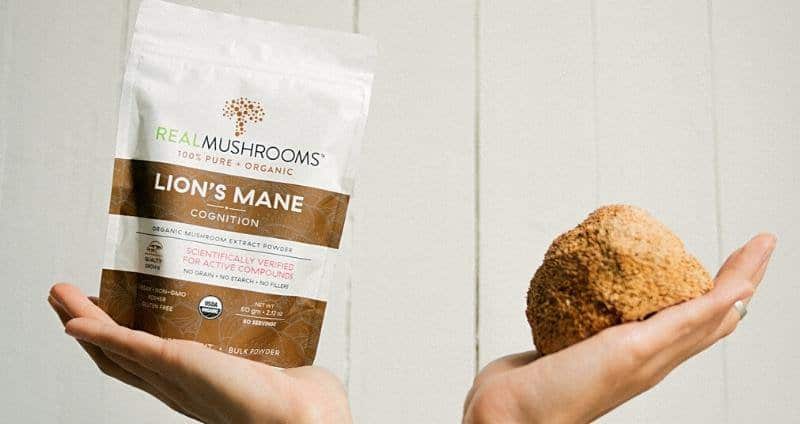

Functional mushrooms are finally getting their well-deserved attention as researchers discover new ways they can benefit our health and well-being. The Lion’s Mane mushroom benefits a number of systems in the body. It is an increasingly popular option around the world for its ample health benefits, unique look, and exquisite taste.
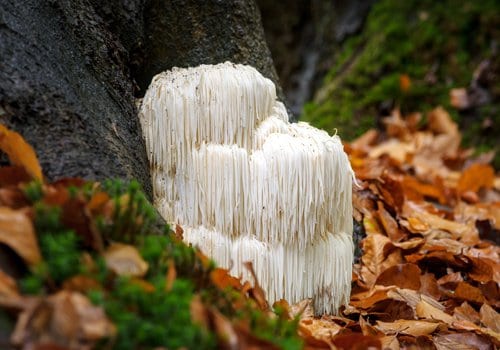
This guide will explore Lion’s Mane mushrooms in a variety of different ways. First, we’ll examine its origin and history to find out just where this interesting fungus came from. We’ll dive into the multitude of wellness and health benefits (including interesting, lesser-known characteristics) that a person can benefit from by including Lion’s Mane mushrooms in their lifestyle.
We’ll also look at how Lion’s Mane mushrooms grow and are extracted for supplement use, how to determine if a Lion’s Mane mushroom product is of high quality and potency, and who can experience Lion’s Mane mushroom health benefits.
There is a lot to unpack about this fascinating health booster, so let’s look at where it came from, how it’s been used, and where it can be found today.
Lion’s Mane is an ancient mushroom originating from Asia. Its culinary and medicinal uses can be traced back through China, Japan, and India over thousands of years¹. Lion’s Mane has been known by various other names through its ancient history, from “monkey head mushroom” in China to “mountain monk mushroom” in Japan to “bearded tooth” and “pom-pom” mushroom in North America.
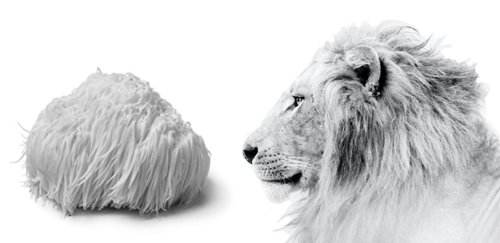
The most common Lion’s Mane species is known as Hericium erinaceus, while the colloquial name of the mushroom comes from its resemblance to a lion’s mane from the animal kingdom [22]. The first thing many will notice about Lion’s Mane is its striking appearance. Its long, thin tendrils and bright white coloring paint a unique picture in comparison to other fungal varieties.
This versatile mushroom can be enjoyed fermented, extracted, or cooked. Lion’s Mane’s taste is often compared to seafood like crab or lobster, and it is frequently used as a vegetarian meat replacement in China and other parts of the world. Lion’s Mane extracts are used in a wide variety of health supplements.
Today, Lion’s Mane mushrooms grow all over North America, Europe, and Asia, with different cultures using it in a variety of ways. You will find Lion’s Mane mushrooms growing in the summer on hardwood and American beech trees. Research is linking Lion’s Mane mushrooms to a wide variety of mental and physical health benefits, leading to a rise in popularity for this fungus.
Lion’s Mane mushrooms are characterized as functional mushrooms for their vast array of potential health benefits. Some other well-known varieties of functional mushrooms include Reishi, Chaga, Turkey Tail, Cordyceps, Maitake, and Shiitake.
Lion’s Mane mushrooms are rising through the ranks of their peers because of their wide range of health benefits, including supporting a healthy inflammation response and boosting brain function, which makes it a very attractive option for those looking to add a mushroom supplement as part of a healthy lifestyle.
However, before exploring Lion’s Mane’s potential and making it part of your daily routine, it is important to understand the potential benefits to your health and how to find a mushroom powder supplement that will be of high enough quality to actually deliver these benefits. There are many Lion’s Mane supplements on the market of less-than-pristine quality that will not provide your body with the bioavailable potency of these mushrooms.
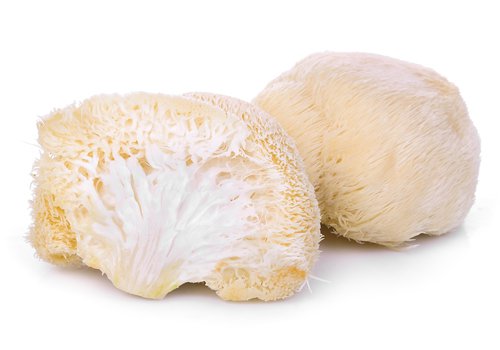
Any substance or supplement that can enhance brain performance can be classified as a nootropic. “Nootropic” is a word that has come into popular parlance in recent years as the supplement industry has increased its focus on identifying natural and synthetic substances that can be taken orally for improving memory, focus, and cognition. However, even a simple and widely used substance such as caffeine can be considered a nootropic, because it boosts brain function.
Lion’s Mane has a long history of being used as a brain-boosting supplement. Chinese Buddhist monks took to consuming Lion’s Mane powder in their tea, claiming it helped them focus in their meditation and increase overall brain power [23]. Modern science has set out to examine the validity of these claims and is finding promising results.
Every time you speak or make a movement or recall someone’s name, nerve impulses are transmitted lightning-fast through a long line of neurons. You may remember from biology class that these neurons have gaps between them and that the gaps are called synapses. For impulses to travel easily through the synaptic gap from one neuron to another, their path needs to be free and clear.
Critically, neurons need good nutrition to do their jobs. Just as a functional country needs a system of transportation to deliver parcels to its inhabitants, a functional brain needs a system of transportation to deliver nutrients to its neurons.
A healthy brain is one in which neurons get the nutrition they need to thrive and can transmit nerve impulses quickly.
Compounds called hericenones and erinacines, when extracted and isolated from Lion’s Mane mushrooms, have qualities that may protect neurons and nerves in our bodies. The unique neuroprotective benefits of Lion’s Mane compounds are speculated to shield the brain from normal mild cognitive impairment associated with aging [22]. These are also the compounds behind some of the other brain-boosting traits of the Lion’s Mane mushroom. Let’s take a closer look at the benefits of taking Lion’s Mane below.
Lion’s Mane mushrooms can help in supporting the health of nerve tissue. Animal studies show that Lion’s Mane compounds can help promote the growth of nerve tissue and support motor function [22]. These benefits are linked to increased production of nerve growth factor (NGF), a compound that maintains the health of neurons in our brains and aids in mild cognitive impairment [23].
Animal tests indicate compounds from Lion’s Mane mushrooms may support nerve impulse transmission as well as support short and long-term memory [22]. Interestingly, the same compounds were found to counter oxidative stress on the brain [22].
Research on consuming Lion’s Mane for brain health has also been conducted in humans. A study in Japan showed that adults with mild memory problems associated with aging who were administered Lion’s Mane mushroom powder scored better on a test of brain function than those who did not take the extract [8]. Their scores then worsened after they ceased taking Lion’s Mane mushrooms.
A study on healthy middle aged individuals using Lion’s Mane mushrooms also showed beneficial results of improving cognitive function and short term memory [42]. Lion’s Mane mushrooms have the potential for promotion of cognitive health based on these findings.
Clearly, taking Lion’s Mane is showing itself to be an incredible ally in supporting cognitive function. Research into how it can help improve the quality of life for many is ongoing. Feedback from some of our customers about our Lion’s Mane supplements provides even more insight into how effective these supplements can be for memory and cognition:
“Since starting to take Lion’s Mane Mushroom capsules I have seen a significant improvement in my memory.” - Nancy
“I am a licensed naturopathic physician and acupuncturist, and I am so grateful to be able to recommend Real Mushrooms formulas to patients. They are of utmost quality-grown and processed properly in order to be truly rich in beneficial mushroom-derived polysaccharide compounds. Personally, I am using your Lion's Mane capsules as part of a neurological support program... Your mushroom extracts are the only ones I use and recommend, because they are the ones I trust most for potency and purity. Thank you for your dedication and integrity!” - Dr. Mark Bricca
These brain-boosting properties can have a positive effect on an individual’s mental health as well. Millions of people worldwide struggle with occasional worry and blue mood, and there are lab and animal studies that show Lion’s Mane’s mood-lifting properties can help [11,12].
Animal studies have shown that taking Lion’s Mane mushrooms supports healthy neuron production in the hippocampus, the part of the brain that regulates emotions. This may support a positive mood and relieve occasional stress [35].
In fact, a small clinical trial out of Japan found that Lion’s Mane mushroom consumption found exactly that, and suggested that the mechanism was different from its NGF-enhancing effects [37]. This clinical trial found Lion’s Mane supplements were able to decrease anxiety while decreasing feelings of irritation and frustration [37].
Here’s feedback on the potential health benefits of Lion’s Mane supplements on mood that we’ve received from some of our customers:
“Real Mushrooms Lion's Mane is amazing. Within 10 minutes of use I feel a positive rush and a boost to my mood. Throughout the day I feel more focused and don't get that afternoon fog anymore. I would definitely recommend their products to anyone” - Gareth
Just like the Buddhist monks, you can add our Lion’s Mane mushroom capsules to your supplement routine to help maintain your focus, boost your productivity, and increase your efficiency.
In fact, a number of the people who use our organic Lion’s Mane extract supplements are students or professionals who enjoy the additional mental energy and focus they get from
taking Lion’s Mane mushroom extract.
“I have used the Lion’s Mane in my matcha latte for the last six months. I do not have brain fog, no afternoon slump and my processing and retention of information is much better. People at work have actually asked me how I do it! I have switched from other suppliers of mushroom supplements to Real Mushrooms and I can feel the difference.” - Michelle
“So far I have had great success supplementing with these mushrooms. Vitality!!!! And clear energy. Not stimulating, yet feels as if you are reaching into the soil and pulling strength from the earth. Highly recommend” – Parker

Brain fog can be a symptom of an aging brain. It can also accompany a number of conditions such as Multiple Sclerosis (MS), Chronic Fatigue Syndroms (CFS), Lupus, insomnia, menopause, and even pregnancy. Brain fog can also be a side effect of certain medications.
Lion’s Mane is a multi-benefit and natural way to gently help combat brain fog:
“Both my parents take Lion’s Mane and it helps them with brain fog and cognitive function. I can definitely see the difference.” - Kelly
“I take 3 capsules a day and my mind feels sharper and I get less brain fog (which has been a big problem when i don’t sleep well enough, so most of the time now). I tried 3 different brands so far and this seems to be the most potent of the bunch.” – Olli
Lion’s Mane also works by advancing the sleep-wake cycle and decreasing wakefulness during the active phase of sleep (REM). Therefore, Lion’s Mane before bed could be helpful for delayed sleep phase syndrome [43]. In addition, Lion’s Mane has further immune-modulating properties that help us deal with external stressors. This, in turn, helps us achieve more restful sleep.
You can also use Lion’s Mane in the morning when you wake up. This helps to restore your biorhythm by keeping you alert and priming your brain for optimal function during your waking hours.
“I am experiencing much better mental focus as well as higher quality sleep. I switched from a different manufacturer's Lion's Mane after learning about Real Mushrooms on a podcast. The quality is definitely here and it is noticeable! Thanks Real Mushrooms.” - Rich

Lion’s Mane mushroom is linked to a plethora of potential health benefits beyond the cognitive and neurological world. Traditional Chinese Medicine has promoted the use of Lion’s Mane for thousands of years as a tonic for everything from digestive health to enhancing general vitality [22]. In fact, one of the most popular Lion’s Mane products in China is a biscuit that is used for tummy troubles.
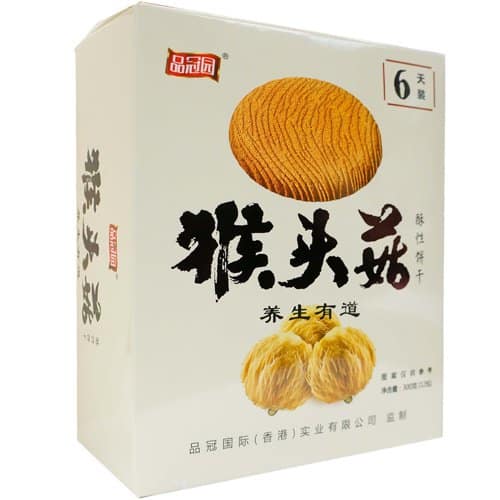
Modern research is again showing these ancient techniques correct, as Lion’s Mane demonstrates it can improve mental, cognitive, and physical well-being in a wide variety of ways. Below are some of the additional ways Lions’ Mane could potentially improve your health:
Functional mushrooms are well known as antioxidant powerhouses that support a healthy inflammation response, so it’s no surprise that Lion’s Mane’s properties make it a heavyweight in that field [13].
Heart health is a common concern among people in the United States. Research is showing how Lion’s Mane may support the health of the cardiovascular system. Maintaining a healthy weight is linked with cardiovascular well-being. Animal studies show that mice fed a high-fat diet showed improved metabolism and healthier weight when administered Lion’s Mane extracts [27]. Lion’s Mane may also work to maintain arterial flexibility by preventing cholesterol from oxidizing [28]. Hericenone B, a compound extracted from Lion’s Mane, has also been found to support healthy blood clotting [29]. All these benefits combine to help keep your heart and cardiovascular system healthy.
Lion’s Mane may help with stomach discomfort and overall digestive health [30, 31]. Inflamed digestive tissues decreased and microbiome diversity increased in a study using a Lion’s Mane protein, two favorable outcomes in irritable bowel diseases [40]. Lion’s Mane is used traditionally to support the digestive organs in Chinese medicine. Recent discoveries in the gut-brain axis suggest that the connection between the two systems is very important to brain health [41].
Balanced blood sugar is a key element of overall health. Lion’s Mane has been shown in animal studies to help keep blood sugar levels steady by modulating enzymes in the small intestine [32].
A healthy immune system is critical in protecting the body from foreign invaders. Lion’s Mane, like other functional mushrooms, can be a helpful ally to the immune system. Studies conducted in vitro indicate it may support a healthy immune response by helping to regulate gut and intestinal bacteria [36]. Mice studies show Lion’s Mane can modulate intestinal mucosal activity to support immune system strength [39].
Functional mushrooms aren’t just beneficial to humans either! The powder is safe for animal consumption and can provide many of the same benefits to dogs and cats when added as a supplement to their meals. Many holistic veterinarians are prescribing functional mushrooms to pets as natural alternative treatments and overall health boosters.
For information about other mushrooms that can support pet health, read our article Medicinal Mushrooms for Pets.
While human studies into this wide range of beneficial health effects continue, it is undeniable that Lion’s Mane extract can be an amazing supplement that contributes to a healthy lifestyle. Whether you’re wanting to improve focus, support metabolic health, or improve your digestive health, Lion’s Mane is a great option that has been in use for centuries.
You can start to experience these benefits for yourself with our Lion’s Mane mushroom powder. It is a high-quality, certified organic supplement with no fillers to ensure you receive the maximum benefit possible.

Real Mushrooms offers two Lion’s Mane extract products, one in capsule form and one in loose powder form.
Real Mushrooms’ organic Lion’s Mane capsules are loaded with powder that is extracted for maximum potency and made of the pure, organic fruiting-body. The ease of taking capsules makes this option a popular choice, since the dosages are pre-measured.
We recommend taking 2 capsules daily for health maintenance.
Real Mushrooms’ Lion’s Mane mushroom powder is made from the mushroom (fruiting body) to ensure maximum efficacy. This creates a product rich in medicinal compounds that we are proud of and this powdered form is very convenient.
Here are some easy and fun ways to add Lion’s Mane extract powder into your daily routine:
The recommended dosage for adults is 1/2 or 1 gram per day but always check with your health care provider before starting any new supplement.
While the health benefits of Lion’s Mane are numerous and well-documented, a small number of people should be careful before adding it to their regular morning ritual.
Anyone with a mushroom allergy should avoid consuming Lion’s Mane until approved by their health care provider. Pregnant or breastfeeding women should seek a doctor’s approval before taking Lion’s Mane. People taking prescription medications, particularly anything related to cognition or blood thinning, should seek a doctor’s advice before adding functional mushroom supplements to their routine.

With supplements, it's very important to look for sourcing and purity. Many brands will add in a variety of fillers, colorings, unnecessary additives, and other ingredients that provide no additional health benefits. These additions are potentially harmful and an indication of a low percentage of the actual Lion’s Mane extract found in the product.
These additives also lead to poor bioavailability and lower the probability of efficient absorption into the human body. To get the most potent and high-value functional fungi supplement, extracts must be made from the mushroom (fruiting body), rather than mycelium on grain [19], and specify beta-glucan content (medicinal compounds).
Even product labels can be misleading. Many popular supplement brands hide the use of myceliated grain and other fillers. This makes it difficult to distinguish whether a supplement contains an extract or the entire mushroom and whether it was made with the mushroom (fruiting body) or its root structure (mycelium).
From its ancient origins in Traditional Chinese Medicine to modern research finding a myriad of health-boosting abilities, Lion’s Mane is an incredible functional mushroom. It has risen among its fungal peers to become one of the most popular functional mushroom supplement options.
Lion’s Mane has been shown to have intriguing brain-boosting abilities and is being studied as a potential aid for supporting cognitive function throughout the ages. It may support the health of the nervous system, the digestive system, and the cardiovascular system, while also supporting a healthy response to inflammation. Studies continue into how Lion’s Mane can boost overall health.
Anyone can add Lion’s Mane to their supplement routine today. You can be confident that Real Mushroom’s organic products are extracted with the most efficient methods to provide you with the maximum benefits. It’s never too early (or late!) to start thinking about your health, and Lion’s Mane extracts are a multi-benefit, convenient, natural, and organic biological powerhouse to add to your routine.

¹Friedman M. (2015). Chemistry, Nutrition, and Health-Promoting Properties of Hericium erinaceus (Lion's Mane) Mushroom Fruiting Bodies and Mycelia and Their Bioactive Compounds. Journal of agricultural and food chemistry, 63(32), 7108–7123.
1,2 https://www.realmushrooms.com/7-medicinal-mushroom-benefits-for-health/
3 https://www.realmushrooms.com/traditional-chinese-medicine-cordyceps-michael-max/
4,5 https://www.realmushrooms.com/is-dual-extraction-necessary-for-mushrooms/
6 https://shop.realmushrooms.com/products/organic-lions-Mane-mushroom-powder-supplement
7 Lai, P. L., Naidu, M., Sabaratnam, V., Wong, K. H., David, R. P., Kuppusamy, U. R., Abdullah, N., & Malek, S. N. (2013). Neurotrophic properties of the Lion's mane medicinal mushroom, Hericium erinaceus (Higher Basidiomycetes) from Malaysia. International journal of medicinal mushrooms, 15(6), 539–554. https://doi.org/10.1615/intjmedmushr.v15.i6.30
8 Mori, K., Inatomi, S., Ouchi, K., Azumi, Y., & Tuchida, T. (2009). Improving effects of the mushroom Yamabushitake (Hericium erinaceus) on mild cognitive impairment: a double-blind placebo-controlled clinical trial. Phytotherapy research : PTR, 23(3), 367–372. https://doi.org/10.1002/ptr.2634
9 Mori, K., Obara, Y., Moriya, T., Inatomi, S., & Nakahata, N. (2011). Effects of Hericium erinaceus on amyloid β(25-35) peptide-induced learning and memory deficits in mice. Biomedical research (Tokyo, Japan), 32(1), 67–72. https://doi.org/10.2220/biomedres.32.67
10 Tsai-Teng, T., Chin-Chu, C., Li-Ya, L., Wan-Ping, C., Chung-Kuang, L., Chien-Chang, S., Chi-Ying, H. F., Chien-Chih, C., & Shiao, Y. J. (2016). Erinacine A-enriched Hericium erinaceus mycelium ameliorates Alzheimer's disease-related pathologies in APPswe/PS1dE9 transgenic mice. Journal of biomedical science, 23(1), 49. https://doi.org/10.1186/s12929-016-0266-z
11 Yao, W., Zhang, J. C., Dong, C., Zhuang, C., Hirota, S., Inanaga, K., & Hashimoto, K. (2015). Effects of amycenone on serum levels of tumor necrosis factor-α, interleukin-10, and depression-like behavior in mice after lipopolysaccharide administration. Pharmacology, biochemistry, and behavior, 136, 7–12. https://doi.org/10.1016/j.pbb.2015.06.012
12 Chiu, C. H., Chyau, C. C., Chen, C. C., Lee, L. Y., Chen, W. P., Liu, J. L., Lin, W. H., & Mong, M. C. (2018). Erinacine A-Enriched Hericium erinaceus Mycelium Produces Antidepressant-Like Effects through Modulating BDNF/PI3K/Akt/GSK-3β Signaling in Mice. International journal of molecular sciences, 19(2), 341. https://doi.org/10.3390/ijms19020341
13 Hou, Y., Ding, X., & Hou, W. (2015). Composition and antioxidant activity of water-soluble oligosaccharides from Hericium erinaceus. Molecular medicine reports, 11(5), 3794–3799. https://doi.org/10.3892/mmr.2014.3121
14 Abdullah, N., Ismail, S. M., Aminudin, N., Shuib, A. S., & Lau, B. F. (2012). Evaluation of Selected Culinary-Medicinal Mushrooms for Antioxidant and ACE Inhibitory Activities. Evidence-based complementary and alternative medicine : eCAM, 2012, 464238. https://doi.org/10.1155/2012/464238
15 Qin, M., Geng, Y., Lu, Z., Xu, H., Shi, J. S., Xu, X., & Xu, Z. H. (2016). Anti-Inflammatory Effects of Ethanol Extract of Lion's Mane Medicinal Mushroom, Hericium erinaceus (Agaricomycetes), in Mice with Ulcerative Colitis. International journal of medicinal mushrooms, 18(3), 227–234. https://doi.org/10.1615/IntJMedMushrooms.v18.i3.50
16 Liang, B., Guo, Z., Xie, F., & Zhao, A. (2013). Antihyperglycemic and antihyperlipidemic activities of aqueous extract of Hericium erinaceus in experimental diabetic rats. BMC complementary and alternative medicine, 13, 253. https://doi.org/10.1186/1472-6882-13-253
17 Li, Y., Zhang, G., Ng, T. B., & Wang, H. (2010). A novel lectin with antiproliferative and HIV-1 reverse transcriptase inhibitory activities from dried fruiting bodies of the monkey head mushroom Hericium erinaceum. Journal of biomedicine & biotechnology, 2010, 716515. https://doi.org/10.1155/2010/716515
18 Kim, S. P., Kang, M. Y., Choi, Y. H., Kim, J. H., Nam, S. H., & Friedman, M. (2011). Mechanism of Hericium erinaceus (Yamabushitake) mushroom-induced apoptosis of U937 human monocytic leukemia cells. Food & function, 2(6), 348–356. https://doi.org/10.1039/c1fo10030k
19 https://www.realmushrooms.com/medicinal-mushroom-benefits-fruiting-body-vs-mycelium/
20 https://shop.realmushrooms.com/products/organic-lions-Mane-mushroom-powder-supplement
21 Lakshmanan, H., Raman, J., David, P., Wong, K. H., Naidu, M., & Sabaratnam, V. (2016). Haematological, biochemical and histopathological aspects of Hericium erinaceus ingestion in a rodent model: A sub-chronic toxicological assessment. Journal of ethnopharmacology, 194, 1051–1059. https://doi.org/10.1016/j.jep.2016.10.084
22 Spelman, Kevin; Sutherland, Elizabeth; Bagade, Aravind. December 19, 2017 Journal of Restorative Medicine, Volume 6, Number 1, 3 December 2017, pp. 19-26(8) https://restorativemedicine.org/journal/neurological-activity-lions-mane-hericium-erinaceus/
23 https://www.indigo-herbs.co.uk/natural-health-guide/benefits/lions-mane
24 Alzheimers Disease. NHS. 10 May 2018. https://www.nhs.uk/conditions/alzheimers-disease/causes/
25 Julson, Erica. 9 Health Benefits of Lion's Mane Mushroom (Plus Side Effects). 19 May 2018. https://www.healthline.com/nutrition/lions-mane-mushroom
26 Heart Disease Facts. Center for Disease Control and Prevention. 8 Sept 2020. https://www.cdc.gov/heartdisease/facts.htm
27 Hiwatashi, K., Kosaka, Y., Suzuki, N., Hata, K., Mukaiyama, T., Sakamoto, K., Shirakawa, H., & Komai, M. (2010). Yamabushitake mushroom (Hericium erinaceus) improved lipid metabolism in mice fed a high-fat diet. Bioscience, biotechnology, and biochemistry, 74(7), 1447–1451. https://doi.org/10.1271/bbb.100130
28 Rahman, M. A., Abdullah, N., & Aminudin, N. (2014). Inhibitory effect on in vitro LDL oxidation and HMG Co-A reductase activity of the liquid-liquid partitioned fractions of Hericium erinaceus (Bull.) Persoon (lion's mane mushroom). BioMed research international, 2014, 828149. https://doi.org/10.1155/2014/828149
29 Mori, K., Kikuchi, H., Obara, Y., Iwashita, M., Azumi, Y., Kinugasa, S., Inatomi, S., Oshima, Y., & Nakahata, N. (2010). Inhibitory effect of hericenone B from Hericium erinaceus on collagen-induced platelet aggregation. Phytomedicine : international journal of phytotherapy and phytopharmacology, 17(14), 1082–1085. https://doi.org/10.1016/j.phymed.2010.05.004
30 Wang, M., Konishi, T., Gao, Y., Xu, D., & Gao, Q. (2015). Anti-Gastric Ulcer Activity of Polysaccharide Fraction Isolated from Mycelium Culture of Lion's Mane Medicinal Mushroom, Hericium erinaceus (Higher Basidiomycetes). International journal of medicinal mushrooms, 17(11), 1055–1060. https://pubmed.ncbi.nlm.nih.gov/28087447/
31 Diling, C., Xin, Y., Chaoqun, Z., Jian, Y., Xiaocui, T., Jun, C., Ou, S., & Yizhen, X. (2017). Extracts from Hericium erinaceus relieve inflammatory bowel disease by regulating immunity and gut microbiota. Oncotarget, 8(49), 85838–85857. https://doi.org/10.18632/oncotarget.20689
32 Wu, T., & Xu, B. (2015). Antidiabetic and antioxidant activities of eight medicinal mushroom species from China. International journal of medicinal mushrooms, 17(2), 129–140. https://doi.org/10.1615/intjmedmushrooms.v17.i2.40
33 Yi, Z., Shao-Long, Y., Ai-Hong, W., Zhi-Chun, S., Ya-Fen, Z., Ye-Ting, X., & Yu-Ling, H. (2015). Protective Effect of Ethanol Extracts of Hericium erinaceus on Alloxan-Induced Diabetic Neuropathic Pain in Rats. Evidence-based complementary and alternative medicine : eCAM, 2015, 595480. https://doi.org/10.1155/2015/595480
34 Kim, S. P., Nam, S. H., & Friedman, M. (2013). Hericium erinaceus (Lion's Mane) mushroom extracts inhibit metastasis of cancer cells to the lung in CT-26 colon cancer-tansplanted mice. Journal of agricultural and food chemistry, 61(20), 4898–4904. https://doi.org/10.1021/jf400916c
35 Ryu, S., Kim, H. G., Kim, J. Y., Kim, S. Y., & Cho, K. O. (2018). Hericium erinaceus Extract Reduces Anxiety and Depressive Behaviors by Promoting Hippocampal Neurogenesis in the Adult Mouse Brain. Journal of medicinal food, 21(2), 174–180. https://doi.org/10.1089/jmf.2017.4006
36 Diling, C., Chaoqun, Z., Jian, Y., Jian, L., Jiyan, S., Yizhen, X., & Guoxiao, L. (2017). Immunomodulatory Activities of a Fungal Protein Extracted from Hericium erinaceus through Regulating the Gut Microbiota. Frontiers in immunology, 8, 666. https://doi.org/10.3389/fimmu.2017.00666
37 Nagano, M., Shimizu, K., Kondo, R., Hayashi, C., Sato, D., Kitagawa, K., & Ohnuki, K. (2010). Reduction of depression and anxiety by 4 weeks Hericium erinaceus intake. Biomedical research (Tokyo, Japan), 31(4), 231–237. https://doi.org/10.2220/biomedres.31.231
38 Vigna, L., Morelli, F., Agnelli, G. M., Napolitano, F., Ratto, D., Occhinegro, A., Di Iorio, C., Savino, E., Girometta, C., Brandalise, F., & Rossi, P. (2019). Hericium erinaceus Improves Mood and Sleep Disorders in Patients Affected by Overweight or Obesity: Could Circulating Pro-BDNF and BDNF Be Potential Biomarkers?. Evidence-based complementary and alternative medicine : eCAM, 2019, 7861297. https://doi.org/10.1155/2019/7861297
39 Sheng, X., Yan, J., Meng, Y., Kang, Y., Han, Z., Tai, G., Zhou, Y., & Cheng, H. (2017). Immunomodulatory effects of Hericium erinaceus derived polysaccharides are mediated by intestinal immunology. Food & function, 8(3), 1020–1027. https://doi.org/10.1039/c7fo00071e
40. Diling, C., Chaoqun, Z., Jian, Y., Jian, L., Jiyan, S., Yizhen, X., & Guoxiao, L. (2017). Immunomodulatory Activities of a Fungal Protein Extracted from Hericium erinaceus through Regulating the Gut Microbiota. Frontiers in immunology, 8, 666. https://doi.org/10.3389/fimmu.2017.00666
41. Carabotti, M., Scirocco, A., Maselli, M. A., & Severi, C. (2015). The gut-brain axis: interactions between enteric microbiota, central and enteric nervous systems. Annals of gastroenterology, 28(2), 203–209.
42. Saitsu, Y., Nishide, A., Kikushima, K., Shimizu, K., & Ohnuki, K. (2019). Improvement of cognitive functions by oral intake of Hericium erinaceus. Biomedical research (Tokyo, Japan), 40(4), 125–131. https://doi.org/10.2220/biomedres.40.125
43. Furuta, S., Kuwahara, R., Hiraki, E., Ohnuki, K., Yasuo, S., & Shimizu, K. (2016). Hericium erinaceus extracts alter behavioral rhythm in mice. Biomedical research (Tokyo, Japan), 37(4), 227–232.<https://www.ncbi.nlm.nih.gov/pubmed/27544998>
 .
.Disclaimer: The information or products mentioned in this article are provided as information resources only, and are not to be used or relied on to diagnose, treat, cure, or prevent any disease. This information does not create any patient-doctor relationship, and should not be used as a substitute for professional diagnosis and treatment. The information is intended for health care professionals only. The statements made in this article have not been evaluated by the Food and Drug Administration. Any products mentioned are not intended to diagnose, treat, cure, or prevent any disease. The information in this article is intended for educational purposes. The information is not intended to replace medical advice offered by licensed medical physicians. Please consult your doctor or health practitioner for any medical advice.